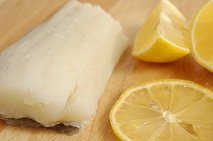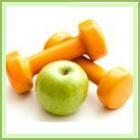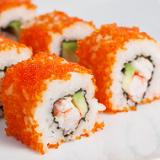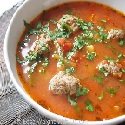Lose Weight
![]() Calories in Food
Calories in Food
![]() Calories in Fish
Calories in Fish
![]() Calories in Haddock
Calories in Haddock
Calories in Haddock, Haddock Nutrition Facts
How many calories in Haddock? See below, the Haddock calories for the different serving sizes. We provide you with Haddock nutrition facts and the health benefits of Haddock to help you lose weight and eat a healthy diet.
Haddock comes from the same family as Cod. This fish has a lovely white flaky flesh when cooked. Haddock provides a great source of nutrients; vitamins B1-B3, B5, B6, B12, D, phosphorus, selenium as well as other vitamins and minerals. They are very low in fat and full of protein.
The Haddock nutrition facts table is provided at the foot of this page. The data is from the US Department of Agriculture, but missing from their data is Iodine. Haddock contains four times our recommended daily intake of Iodine. Our body does not make iodine, so it's essential we get it from foods as it helps to keep the thyroid gland working properly. The thyroid controls our metabolism.
Haddock also contains omega 3 and is therefore thought to help lower cholesterol. Other Haddock benefits are thought to include added protection against both heart disease and some types of cancer.
Compare the calories in Haddock with the other calories in fish.

Calories in Haddock, Raw
Refuse: 0%Scientific Name: Melanogrammus aeglefinus (L.)
| Serving Size | Calories per Serving |
| 100 grams | 74 kcal (309 kJ) |
| 1 fillet, 193 grams | 143 kcal (596 kJ) |
| 3 oz, 85 grams | 63 kcal (263 kJ) |
Fish, Haddock, Cooked, Dry Heat
Refuse: 0%| Serving Size | Calories per Serving |
| 100 grams | 90 kcal (378 kJ) |
| 1 fillet, 150 grams | 135 kcal (567 kJ) |
| 3 oz, 85 grams | 76 kcal (321 kJ) |
Fish, Haddock, Smoked
Refuse: 0%| Serving Size | Calories per Serving |
| 100 grams | 116 kcal (485 kJ) |
| 1 oz, boneless, 28.35 grams | 33 kcal (137 kJ) |
| 1 cubic inch, boneless, 17 grams | 20 kcal (82 kJ) |
| 3 oz, 85 grams | 99 kcal (412 kJ) |
Haddock Nutritional Information
| Nutritional value per 100 g (3.5 oz) | |
|---|---|
| Proximates: | |
| Water | 79.65 g |
| Energy | 378 kJ (90 kcal) |
| Protein | 19.99 g |
| Carbohydrates | 0.0 g |
| Total Fat: | 0.55 g |
| saturated fat | 0.111 g |
| monounsaturated fat | 0.074 g |
| polyunsaturated fat | 0.204 g |
| Cholesterol | 66 mg |
| Minerals: | |
| Calcium, Ca | 14 mg (1.4 %) |
| Iron, Fe | 0.21 mg (1 %) |
| Magnesium, Mg | 26 mg (7 %) |
| Phosphorus, P | 278 mg (28 %) |
| Potassium, K | 351 mg (7 %) |
| Sodium, Na | 261 mg (11 %) |
| Zinc, Zn | 0.40 mg (3 %) |
| Copper, Cu | 0.026 mg (1.3 %) |
| Manganese, Mn | 0.013 mg (1 %) |
| Selenium, Se | 31.7 mcg (45 %) |
| Vitamins: | |
| Thiamine (Vit. B1) | 0.023 mg (1.5 %) |
| Riboflavin (Vit. B2) | 0.069 mg (4 %) |
| Niacin (Vit. B3) | 4.119 mg (21 %) |
| Pantothenic acid (B5) | 0.494 mg (5 %) |
| Vitamin B6 | 0.327 mg (16 %) |
| Folate (Vit. B9) | 13 mcg (3 %) |
| Vitamin B12 | 2.13 mcg (36 %) |
| Vitamin A | 62 IU (1 %) |
| Vitamin E | 0.55 mg (3 %) |
| Vitamin D | 23 IU (6 %) |
| Percentages are relative to US Recommended Daily Intake (RDI) for adults. | |
Author: Lana Soko
You Might Also Like:
Like This Page?
|
Share This Page:
|
Search Our Site:

Free E-Book:
We Recommend:
Looking to get your body into great shape? Get the very best results for your efforts and money! Save your valuable time from surfing the internet. These are theBestselling Weight Loss Programs

Programs that work and have thousands of satisfied customers worldwide!

 |




